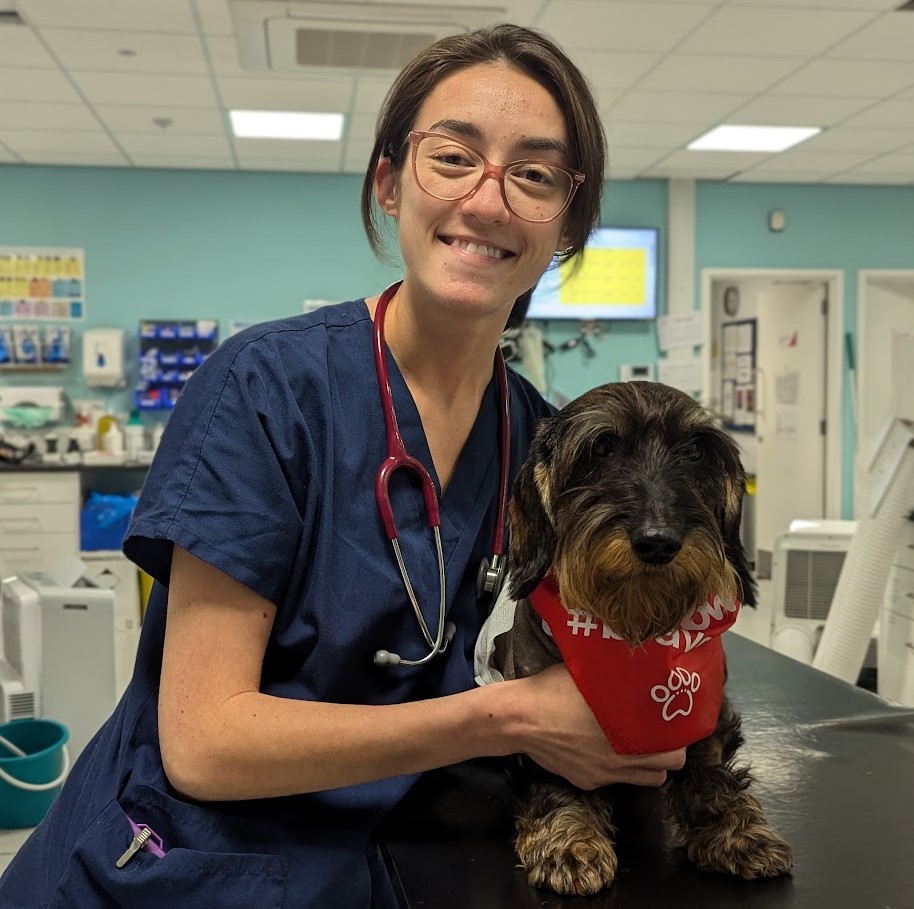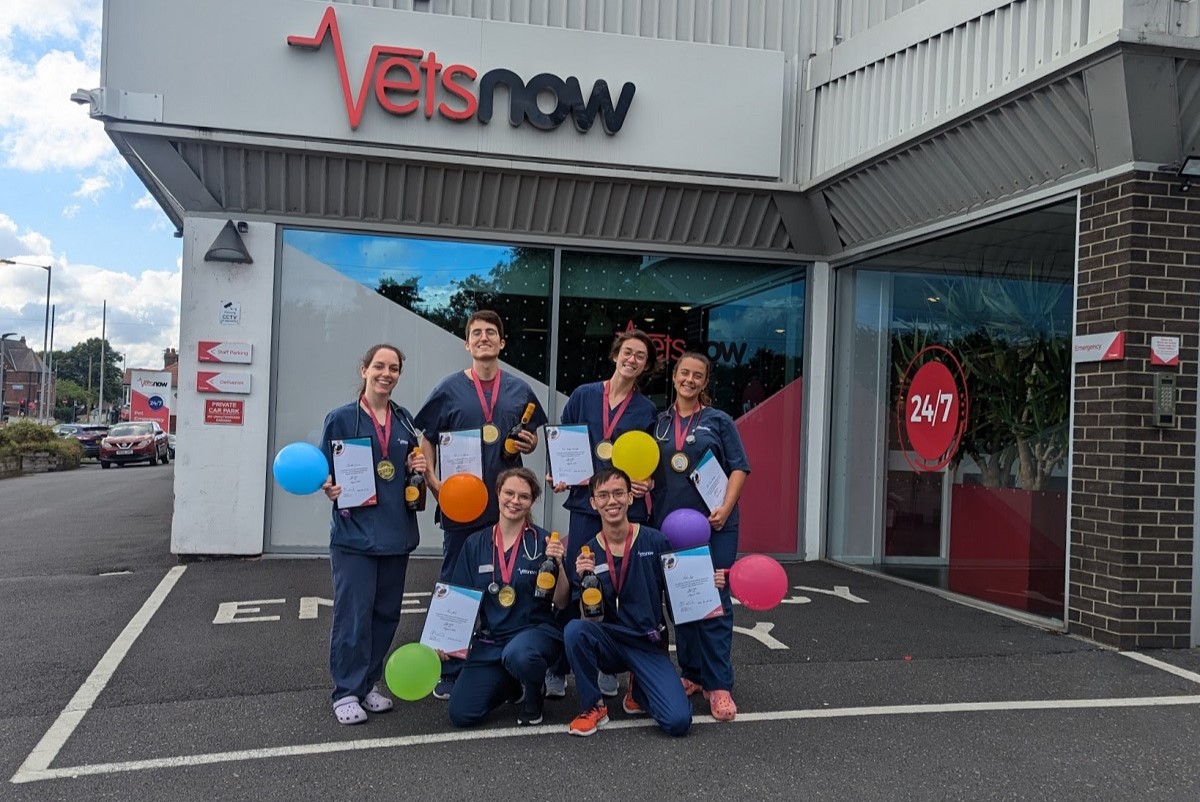Veterinary surgeon Corrie Stirling-Stainsby is dedicated to advancing her skills in ECC, having discovered a passion for the role while on Vets Now’s Cutting Edge ECC induction programme.
Her next steps have seen her remain with Vets Now, first completing a rotating internship at our 24/7 emergency and referral hospital in Manchester and now undertaking an ECC discipline specific internship there as well.
In this Q&A, Corrie shares her experience on the rotating internship and why she chose to return to Vets Now to further develop her skills.
What is your background and what brought you to Vets Now?
I graduated from Nottingham Vet School in 2019 and worked in several different practices, at night and during the day. I first started working in a first opinion hospital and as a locum in the interim, before doing the Cutting Edge programme in 2021. A few mutual university friends had done Cutting Edge and the rotating internship so I had a good understanding of what they offered before applying to them both.
What attracted you to Vets Now?
I already had a connection with Vets Now from my experience on Cutting Edge. I had a really positive experience working for them and I had an interest in ECC, primarily from my time working nights. I knew I wanted to gain skills practicing evidence-based veterinary medicine and I was attracted to this internship at Vets Now due to their ethos. You are encouraged to learn in a supportive environment with a no blame culture, and work with a multi-disciplinary team of talented vets and vet nurses. They really looked after their staff and their mental well-being.
Corrie Stirling-StainsbyMost of the interns would agree that the OOH shifts were challenging, but they inevitably improved my clinical understanding of a wide variety of cases and triage/prioritisation skills

What did the internship involve?
It covered the core disciplines; Internal Medicine, ECC, Surgery, Out-of-hours (OOH) and Imaging. There was also an externship block which gave us the opportunity to seek further experience and understanding of similar or different disciplines outside of the hospital. This was great for me as I had an interest in neurology and saw a lot of neurological cases, such as paretic or seizuring patients, in OOH. The time I spent with different neurology departments has helped alleviate my initial wariness of neurological cases, which I didn’t see as often in first opinion. We also had weekly seminars on commonly seen presentations that were very helpful and informative.
What did you hope to have gained by the end of your internship?
I hoped to gain new and improved medical practical skills and a better understanding of my preferred area of specialism, of which ECC was my favourite. I also hoped to gain a more systematic evidence-based approach on managing hospitalised patients and I was able to practice this, especially during my ECC rotation.
Did it live up to your expectations?
Yes, it did and so much more! I particularly enjoyed doing point of care ultrasound, placing nasogastric or oesophagostomy tubes and central lines, and I have a lot more confidence now having gained this experience. The great relationship I had with the wider team and intern cohort made my days very enjoyable and efficient, who doesn’t wish for that in their role! I had heard from prior friends on different internships that they struggled with their work-life balance but I really felt this was achievable during the internship and still managed to keep up my social extra-curricular hobbies, such as playing league hockey.
As part of the internship, you worked out of hours in ECC. What do you think of these shifts?
Most of the interns would agree that the OOH shifts during the internship were challenging but they inevitably improved my clinical understanding of a wide variety of cases and triage/prioritisation skills. This internship, compared to most, has a greater emphasis on OOH and I was supported in my approach and management of these cases as there were always numerous vets working with us throughout different parts of the shift. Some of my fellow interns found the OOH shift their favorite rotation and have stayed on as part of the OOH team.
Corrie Stirling-StainsbyI have no doubt it has been the best career move I have made, while confirming my passion for ECC

Do you think that the internship is good preparation for working in ECC?
Yes, for sure. I have gained a better approach for managing the more challenging sick cases having done the internship, especially given we treat a large number of varying cases through our OOH service that we provide.
What advice would you give to people who were thinking about applying for an internship at Vets Now?
I would highly recommend this to any vet who wants to expand their clinical knowledge and skills, whether they are considering referral work or first opinion hospital work with a particular interest. The supportive and friendly nature of the team is there from day one and I have no doubt it has been the best career move I have made, while confirming my passion for ECC.
What have you done since completing the rotating internship?
I have been lucky enough to have started the ECC discipline specific internship in the last few months and am able to continue working with an amazing team and learn even more in the next year. Furthermore, I have been given the opportunity to present at Vets Now Congress this November which I’m very much looking forward to!
My future goals are still unknown for now, but it definitely involves a passion for ECC whether that is working as an ECC day vet in a first opinion/referral hospital or applying for ECC residencies in the future.
Click here to apply to Glasgow or Manchester referral hospital – closing date January 10th
